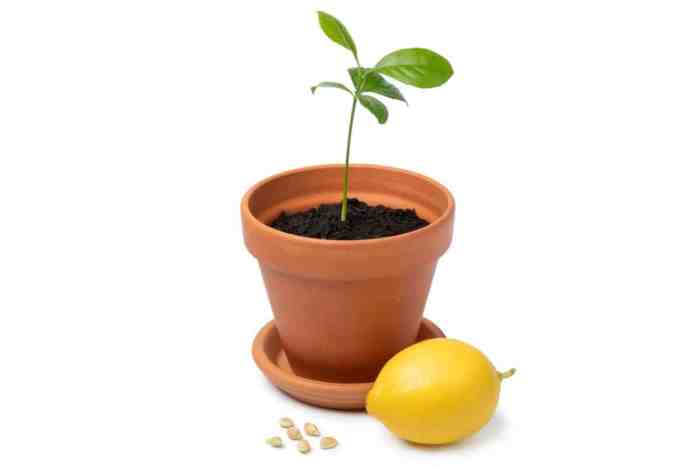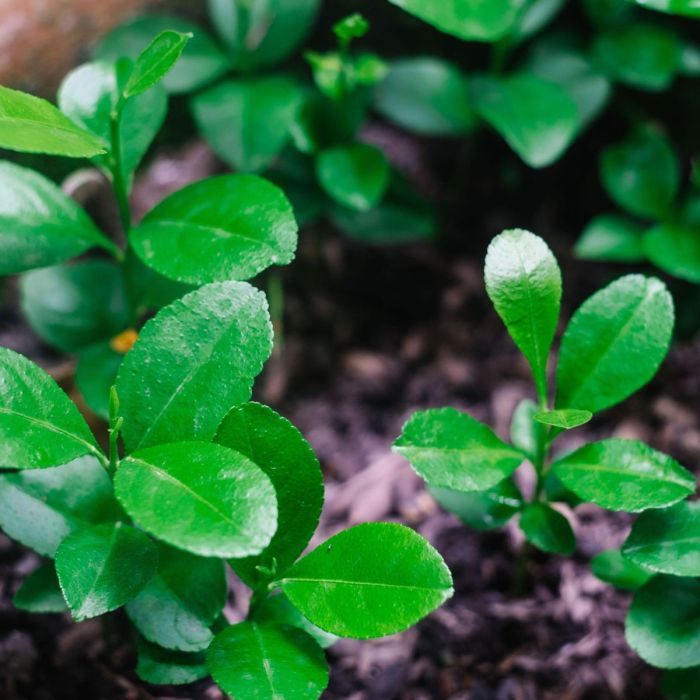Can You Plant Lemon Seeds From a Lemon?
Lemon Seed Viability
Can you plant lemon seeds from a lemon – Growing lemon trees from seed presents a unique challenge. While it’s possible, the process isn’t always straightforward due to the inherent variability in seed viability and the specific needs of lemon seedlings. This section explores the factors influencing the success of growing lemons from seed, providing insights into seed selection and preparation for optimal germination.
Germination Rate of Store-Bought Lemon Seeds
The germination rate of lemon seeds from store-bought lemons is generally low, often ranging from 10% to 30%, depending on the freshness of the fruit and the storage conditions. Many seeds may be underdeveloped or simply not viable. This low success rate is primarily due to the fact that store-bought lemons are often harvested before the seeds reach full maturity.
Factors Affecting Seed Planting Success

Source: gardentabs.com
Several factors influence the success rate of planting lemon seeds. Seed freshness is crucial; seeds from recently harvested lemons have a higher chance of germination. Environmental conditions, including temperature, humidity, and light, also play a significant role. Optimal conditions promote quicker and more successful germination.
Viability Comparison Across Lemon Varieties
While there isn’t extensive research directly comparing the viability of seeds across all lemon varieties, anecdotal evidence suggests some minor variations. Seeds from certain varieties may exhibit slightly higher germination rates than others, potentially linked to genetic factors and fruit maturity at harvest. However, the overall low germination rate remains consistent across most varieties.
Assessing Lemon Seed Viability Before Planting
Before planting, assess seed viability to increase your chances of success. A simple method involves soaking the seeds in water for 24 hours. Viable seeds will generally absorb water and become slightly plump. Discard any seeds that remain shriveled or float on the surface, as these are likely non-viable.
Planting Procedures
Proper planting techniques significantly impact the success of growing lemon trees from seed. This section details optimal soil preparation, planting methods, and watering techniques.
Optimal Soil Composition and Preparation
Lemon seeds thrive in well-draining, slightly acidic soil (pH 6.0-6.5). A suitable mix could be composed of equal parts potting soil, perlite, and peat moss. Ensure the soil is moist but not waterlogged before planting.
Comparison of Planting Methods
| Method | Pros | Cons | Success Rate (Estimate) |
|---|---|---|---|
| Direct Sowing | Simple, less handling | Higher risk of seed rot, slower germination | 10-20% |
| Starting in Seed Trays | Better control over environment, higher germination rate | More labor-intensive | 20-30% |
Proper Watering Techniques

Source: futurecdn.net
Consistent moisture is vital for germination. Keep the soil consistently moist but not soggy. Overwatering can lead to root rot, while underwatering can hinder germination. Use a spray bottle to gently mist the soil, avoiding directly drenching the seeds.
Potential Germination Problems and Solutions
- Problem: Seed rot. Solution: Ensure well-draining soil and avoid overwatering.
- Problem: Slow or no germination. Solution: Check soil temperature and humidity; ensure adequate light.
- Problem: Fungal growth. Solution: Use a fungicide according to label instructions.
Seedling Care
Once germinated, lemon seedlings require specific care to ensure healthy growth and development. This section focuses on providing optimal conditions, fertilization, pest control, and repotting schedules.
Sunlight, Temperature, and Humidity
Lemon seedlings need bright, indirect sunlight for at least 6-8 hours daily. Maintain a temperature between 65-75°F (18-24°C) and a humidity level of around 50%. Avoid placing seedlings in direct sunlight, which can scorch their leaves.
Fertilization
Use a balanced liquid fertilizer diluted to half strength every 2-3 weeks during the growing season. Avoid over-fertilizing, as this can damage the delicate root system. A fertilizer specifically formulated for citrus plants is recommended.
Pests and Diseases
Common pests include aphids and spider mites. Preventative measures include regularly inspecting seedlings and using insecticidal soap or neem oil if pests are detected. Fungal diseases can occur with excessive moisture; ensure good air circulation and avoid overwatering.
Repotting Schedule
Repot seedlings into larger containers as they grow. Start with small pots (2-3 inches) and gradually increase the size as the root system develops. Repot every 3-4 months, or when roots become pot-bound.
Growth and Development
Understanding the growth rate and developmental stages of lemon seedlings is crucial for providing appropriate care. This section explores the expected growth, compares seed-grown vs. cutting-grown plants, and explains the process of grafting.
Yes, you can plant lemon seeds from a lemon, though it’s a lengthy process with uncertain results. Similarly, the success of establishing a lawn depends on various factors, including soil preparation; you might wonder, as many do, can you plant grass seed without straw , and the answer, like with lemons, often involves a bit of trial and error.
Ultimately, both endeavors require patience and the right conditions for optimal growth.
Expected Growth Rate Under Ideal Conditions, Can you plant lemon seeds from a lemon
Under ideal conditions, lemon seedlings can grow several inches per month during their first year. Growth rate slows in subsequent years, but the plant continues to develop a stronger root system and eventually produces flowers and fruit.
Seed-Grown vs. Cutting-Grown
Seed-grown lemon trees take significantly longer to bear fruit (often 5-10 years) compared to trees grown from cuttings (2-3 years). Cutting-grown trees are also genetically identical to the parent plant, ensuring consistent fruit quality and yield. Seed-grown trees exhibit more genetic variability.
Grafting Process
Grafting is a common technique used to improve fruit quality and yield. A scion (cutting) from a desirable lemon variety is grafted onto a rootstock (seedling). This combines the desirable fruiting characteristics of the scion with the robust root system of the rootstock.
Timeline of Growth Stages
A detailed timeline would vary depending on conditions, but a general Artikel could include: Germination (2-4 weeks), initial growth (first 6 months, small plant, few leaves), active growth (second year, larger plant, more leaves), flowering (3-5 years), fruiting (5-10 years).
Illustrative Examples
Visualizing the characteristics of a healthy lemon seedling and understanding the structure of a lemon seed enhances the understanding of the entire growing process.
Appearance of a Healthy Lemon Seedling
A healthy lemon seedling at different stages: Early stage (small, delicate stem, few oval-shaped leaves, small taproot); later stage (stronger stem, more leaves, branching root system, slightly woody stem); mature seedling (larger, robust stem, many leaves, extensive root system, slightly thicker stem).
Detailed Description of a Lemon Seed
A lemon seed is typically oval-shaped, with a hard, outer coat (testa). Inside, there is a small embryo with a radicle (embryonic root) and plumule (embryonic shoot). The endosperm provides nutrients for the developing embryo. The seed coat is typically a light brown or tan color.
Indoor Setup for Growing Lemon Seedlings
An ideal indoor setup would include a bright location (near a south-facing window, supplemented with grow lights), a consistent temperature of 65-75°F (18-24°C), and humidity maintained around 50% using a humidifier or pebble tray. The seedling should be placed in a pot with drainage holes.
FAQ Insights: Can You Plant Lemon Seeds From A Lemon
How long does it take for a lemon seed to germinate?
Germination can take anywhere from a few weeks to several months, depending on seed viability and environmental conditions.
What kind of soil is best for growing lemon seedlings?
Well-draining, slightly acidic soil rich in organic matter is ideal. A citrus-specific potting mix is recommended.
Can I grow a lemon tree from seed indoors?
Yes, but you’ll need to provide supplemental light, especially during winter months, to ensure sufficient sunlight.
When can I expect my lemon tree to produce fruit?
Lemon trees grown from seed typically take 5-15 years to bear fruit, significantly longer than those grown from cuttings.





















